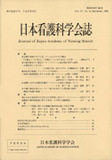Japanese
English
- 販売していません
- Abstract 文献概要
- 参考文献 Reference
- サイト内被引用 Cited by
要旨
本研究は,育児期の家族の中で生活している女性の自己概念を記述することを目的とした.中でも,自己概念を「母親としての自己」と「母親として以外の自己」にわけて注目し,その二つの自己の存在状況を明らかにした.3歳児を育児中の女性7名を対象として,半構成面接を実施し,帰納法的・質的因子探索型の分析を行った.
育児期の女性の自己概念は,他者から必要とされる自己の獲得により充実が得られるという結果を得た.さらに,わが子に必要とされることは,「母親としての自己」を,社会(職場)で必要とされることは,「母親として以外の自己」を充実させ,現代の育児期の女性はその二つの自己の充実を望んでいた.そしてそのことを受容する家族と生活している女性の自己概念は「調和」しており,「母親として以外の自己」の充実を受容しない家族と生活している女性は,「葛藤」していた.
Abstract
A retrospective exploratory-descriptive design was used to describe the modern Japanese women's self-concept during the early stages of childrearing. The purpose of this research was to explore how a Japanese woman's self-concept changes after she becomes a mother. Seven women, aged 28 to 38, from a purpose sample, were interviewed at home using the-semi-structured interview guide.
The core category, “someone needs me”, provided the more significant indicator of women's self-concept, reflecting the importance of their existence to others. Findings indicated that the modern Japanese woman seeks to be needed by two parties: their children and society. One of these needs originates in the self as a mother. The other originates in the self as an individual with a life of their own. In the acceptance, through family life, of the fulfillment of the two selves,: “myself needed by my child” and “myself needed by society”, the self -concept of modern Japanese women during the early stages of childrearing was defined.
Copyright © 1997, Japan Academy of Nursing Science. All rights reserved.


